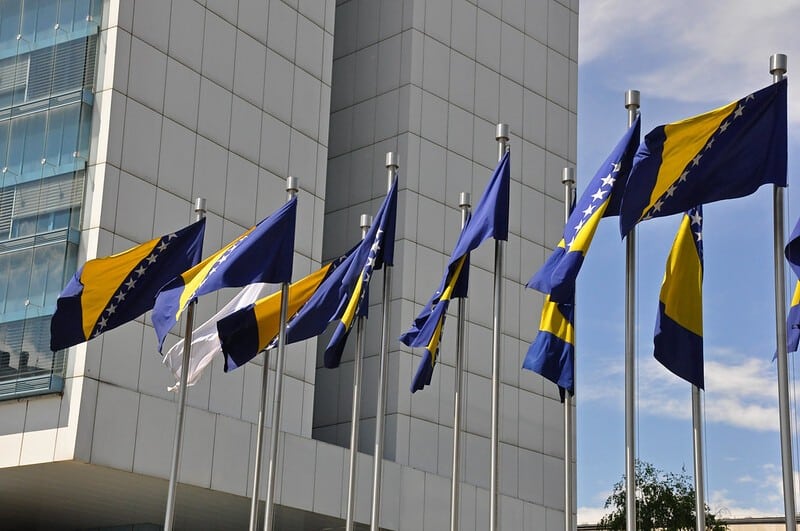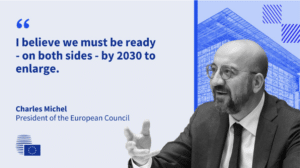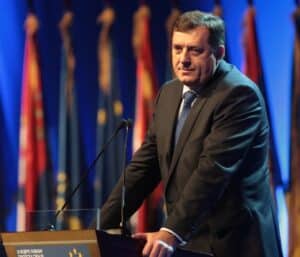Bosnian flags outside the parliament, 2011 (Flickr)
In Bosnia, social democrat Denis Bećirović (SDP) took a demanding victory at the 2 October polls to become President of the Bosniak entity in the country. Despite the fact that not much seems to change in Bosnia and Herzegovina’s domestic politics due to other results in the complex electoral system, the choice of Bećirović was a pleasing outcome for anyone who supports Bosnian EU ambitions. The social democratic candidate defeated Bosniak nationalist Izetbegović.
Nationalist parties preserve majority
People throughout Bosnia-Herzegovina (BiH) went to the polls on 2 October. In the framework of the country’s complex electoral system, people voted for the Serb, Bosniak and Croat members of the Presidency. Furthermore, voters in both the Republika Srpska and Federation of Bosnia and Herzegovina casted votes for the House of Representatives, whereas citizens of Republika Srpska also additionally voted for the Assembly of Republika Srpska. After several days, the Bosnian people still do not completely know the official results of the elections. Nevertheless, most of the votes have been counted, making it broadly clear who the losers and who the winners are. In BiH’s assembly, little seems to change. The nationalist parties SNSD, SDA and HDZ BiH again received the most votes, suggesting that the population still votes largely based on ethnicity. BiH’s political system has maintained these ethnic divisions since the signing of the Dayton Peace Agreement in 1995.
Ethnic tensions do not seem to be eased by the choice of Milorad Dodik as president of Republika Srpska either. His election was one of the surprises, he defeated his main opposing candidate Jelena Trivić. Due to the slow ballot counting process, both claimed victory on election night, which partly called into question the integrity of the election. As Serb presidency member, Dodik has been a highly controversial figure whose leadership and pro-Russian stance sharpened ethnic tensions.
Bećirović, a non-nationalist newcomer to the presidency triplet
In his role as Presidency member, Dodik is replaced by fellow party member Željka Cvijanović (SNSD). The new triplet of Presidency Members consists further of non-nationalist Croat member Željko Komšić (DF), who won against Borjana Krišto (HDZ BiH) and Denis Bećirović of the multi-ethnic Social Democratic Party (SDP BiH), who won against nationalist Bakir Izetbegović (SDA). The choice for Bećirović over Izetbegović can be seen as a partial split from the nationalist-dominated political system that has prevailed in BiH for years. It was the first time Bećirović had been elected after losing narrowly against Izetbegovic in 2018. That his victory was resoundingly clear seems to support Bosnian ambitions towards EU membership.
Komšić’s tenure and Bećirović’s new arrival offer opposition to the Euroscepticism of Cvijanovic’s party. Their European aspirations match the wishes of the Bosnian population. An opinion poll published by research institute NDI in May 2022 reported that as many as 85% of the Bosnian population said they wanted to join the EU by 2021. Support is particularly high among Bosniaks and Croats, but Republika Srpska respondents (64%) also showed a majority in favour of EU membership. Future accession to NATO continues to divide opinions sharply: among Bosniaks and Croats, support for it is above 90%, while among Serbs it is less than 20%.
Schmidt makes surprising move right before closing
The EU High Representative to BiH, German diplomat Christian Schmidt, made a surprising move by using his “Bonn powers” to impose an amendment to the electoral law and constitution of the Federation of Bosnia and Herzegovina. The Bonn powers allow Schmidt to make binding decisions when local parties appear unable or unwilling to act and to dismiss officials who violate legal obligations or, in general, the Dayton peace agreement. The use of these powers took place just before the closure of polling stations. The amendments to the constitution of the Federation of Bosnia and Herzegovina include increasing the size of the Federation House from 58 to 80 people and increasing the constituencies of the three main ethnic groups from 17 to 23 people.
The intervention serves the same purpose as Schmidt’s controversial proposal in July, which provoke outrage among Bosnian voters. The constitutional amendment is expected to increase Croatian political presence in the Federation of Bosnia and Herzegovina. This time, however, the Bosnian and Croat parties seem to have accepted the intervention with only a few complaints. Several European parliamentarians, including the head of the European Parliament’s election observation delegation in Bosnia Andreas Schieder, expressed dissatisfaction with Schmidt’s action. Many commented that it seemed to undermine democracy.
What is next?
What the future holds for Schmidt in BiH will undoubtedly be discussed in the near future, especially as the clouds lift after elections. In addition, it will be interesting to see to what extent Bećirović’s arrival will affect a reformist course in foreign policy. That much will change at the domestic level in the coming period is doubtful. The nationalist parties have been given limited time by Schmidt to go to the drawing board to form a coalition. The most important thing, of course, remains that the fragile peace in Bosnia is not broken by new tensions.
Author: Mathieu Neelen
Sources: BalkanInsight1, BalkanInsight2, EUObserver, IFIMES, NDI, Reuters
Photo: Flickr



